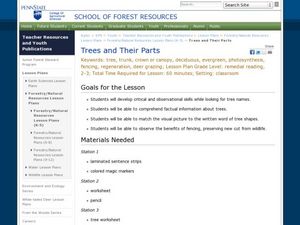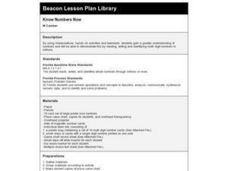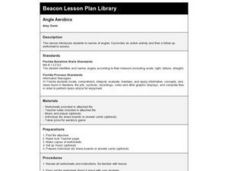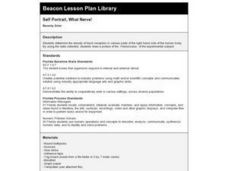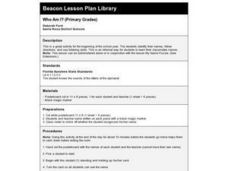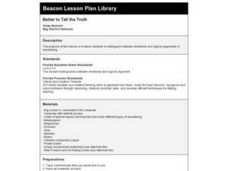Curated OER
Rocking the Boat
Students work together to discover the concepts of stability and equilibrium. They examine how equilibrium is related to an item's center of mass. They create their own action scene in a literacy activity.
Curated OER
Count by Fives
Students explore counting by fives up to one hundred using a hundreds chart. They create counting hands that are hung on a clothespin and string, and students orally count by fives to one hundred.
Curated OER
Math & Science
Students examine a list of ideas to draw from for lesson planning. They complete a quiz on Math & Science and hand in notes they have taken as a resource for lesson planning. They develop developmental appropriate practice...
Curated OER
Trees and Their Parts
Students visit five learning stations to explore various aspects of trees. They look for tree names, match visual pictures to the written words of tree shapes, and observe the benefits of fencing and preserving new cut from wildlife.
Curated OER
Toothpick Breakdown
Fourth graders model the activity of an enzyme acting on a substrate and observe relationships. Have students place toothpicks in a pile. One member of the team should break as many toothpicks as possible, in 10 seconds.
Curated OER
American History Research with Visual Timeline
Fifth graders research from a Washington, D.C. landmark, write a three page paper, then create a project depicting their topics to go on a time-line.
Curated OER
Know Numbers Now
Fourth graders, in teams, get a set of magnetic cards. They come up to the front of the class and create a new number on the chart.
Curated OER
Angle Aerobics
Third graders review angle criteria and then stand. They demonstrate with their hands each type of angle called out by the teacher: right, acute, or obtuse. Music is added and students follow teacher in an angle aerobics class peppered...
Curated OER
Trees and Their Parts
Learners research trees and their parts. In this forestry instructional activity, students participate in various learning stations to identify trees by matching the photographs of the tree to the correct name.
Curated OER
M&M Graphing and Probability
Students create a variety of graphs. They count, sort, and classify M&M's by color and record data on a chart. They use data from the chart to create pictographs, bar graphs and circle graphs. They analyze data and determine...
Curated OER
The Great Chile Challenge
Fifth graders gather data, create a graph, and interpret information. They build vocabulary by negotiating the ideas that go into the graphs which they create. They use Excel to print a variety of graphs based on how much they like Chile...
Curated OER
The X-33 and the X-38
Students explore the relationships among the lengths, areas, and volumes of similar solids. They also discover what effect doubling the dimensions of a figure has on the resulting area.
Curated OER
Self Portrait, What Nerve!
Students conduct an experiment to determine the distance between touch receptor fields in parts of the right-hand side of the body. They enter data into the data table.
Curated OER
Probability or Ability?
Young scholars toss candy and coins using their non-dominant hand while their partners records the results on a probability charts.
Curated OER
Probability or Ability?
Pupils use their non-dominant hand to catch candy which they tossed in the air. They estimate how many they catch in a second round. They record and determine how the probability changed the second time.
Curated OER
Who Am I? (Primary Grades)
Students identify their names, follow directions and use listening skills to learn their classmates names in a game format.
Curated OER
Summarizing the American Flag
Third graders brainstorm and write summary of things they learned about American Flag, edit another student's summary, rewrite their own summary, and conference with teacher before writing final copy.
Curated OER
Trash It
First graders see how to throw away their mean thoughts instead of saying them to the person with whom they are upset. They write their thought or the words down on the piece of paper, including their names and throw them away in the...
Curated OER
GET READY FOR FCAT WITH MUSIC IN OUR SCHOOLS MONTH!
Students integrate writing skills with music. They select three to four topics to write about and print out on decorative paper.
Curated OER
Forces and Balloons
Middle schoolers investigate the forces of compression, tension and torque on common birthday balloons.
Curated OER
Sensational Seasonal Students
First graders analyze the seasons and cycles of the Earth. In groups, they create a seasons book on the computer using their own photographs and graphics. Using the photographs, they note the differences in clothing and activities. They...
Curated OER
Geo Jammin' - Day 5, Lesson 19: Hey, Hey, Whaddaya Say!
Students rehearse scripts by recording themselves on audiotape and then playing it back to self-assess strengths and weaknesses.
Curated OER
Better to Tell the Truth
Third graders distinguish between emotional and logical arguments in advertising. They, in groups, find ads in newspapers and magazines illustrating the various types of emotional and logical arguments in advertising discussed on day one.
Curated OER
Brown Bag It
Fourth graders draw an object relying only on their sense of touch and imagination and then draw it again using their powers of observation to create a detailed study of the object. Comparisons are then made of the two drawings.





